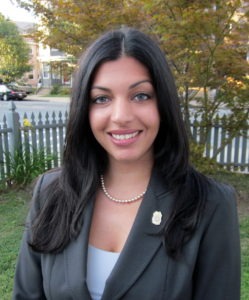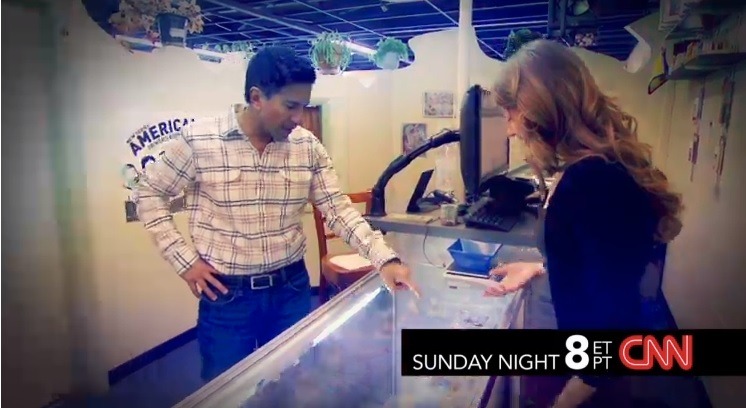CNN’s Sanjay Gupta made headlines last week when he renounced his previous views on medical marijuana. In his documentary Weed, which aired on Sunday, Gupta explored the medical marijuana industry and highlighted the benefits the drug has made in the lives of patients.
We reached out to medical marijuana lawyer Shaleen Title by email to get her take on Gupta’s documentary and the coverage of the issue. Title has been working to reform drug laws since she co-founded the Students for Sensible Drug Policy chapter at the University of Illinois in 2002. She is currently on the board of Marijuana Majority.
Why is Sanjay Gupta’s change of heart significant?
Although the conclusions he’s drawing aren’t new — the medical benefits of marijuana have been well-established in science for [pullquote]Dr. Gupta’s declaration and apology are part of a significant cultural shift.[/pullquote]decades — Dr. Gupta’s declaration and apology are part of a significant cultural shift. As pointed out in his documentary Weed, many of the objections to medical marijuana are steeped in racist and cultural fears dating back to when marijuana first became illegal in the 1930s. Harry Anslinger, the first “drug czar,” created a narrative that Mexican and black men were using marijuana and then murdering and raping white women. These scenes sound laughable now, but as Dr. Gupta mentioned, in some ways these themes have defined attitudes about marijuana for the last 70 years.
 When we see a popular, trusted cable news doctor like Dr. Gupta not just highlighting the science but literally apologizing for his past ignorance of the science, it shows that we are moving past these fears and public opinion is truly shifting. CNN is following the trends of the public, where the latest polls show that 81 percent of Americans support allowing the medical use of marijuana and 50 percent support legalizing it outright. I think Dr. Gupta’s stance is a good representation of the average American’s stance on marijuana; perhaps earlier, the average person didn’t have the time or interest to think too much about marijuana or to wade past all of the fear tactics (like DARE). But today, with 20 states plus D.C. allowing medical marijuana, its use and potential are common knowledge. The prior stigma that people were just using the concept to “get high” is largely disappearing. I thought Dr. Gupta’s statement, “We have been terribly and systematically misled for nearly 70 years in the United States, and I apologize for my own role in that,” was a powerful admission.
When we see a popular, trusted cable news doctor like Dr. Gupta not just highlighting the science but literally apologizing for his past ignorance of the science, it shows that we are moving past these fears and public opinion is truly shifting. CNN is following the trends of the public, where the latest polls show that 81 percent of Americans support allowing the medical use of marijuana and 50 percent support legalizing it outright. I think Dr. Gupta’s stance is a good representation of the average American’s stance on marijuana; perhaps earlier, the average person didn’t have the time or interest to think too much about marijuana or to wade past all of the fear tactics (like DARE). But today, with 20 states plus D.C. allowing medical marijuana, its use and potential are common knowledge. The prior stigma that people were just using the concept to “get high” is largely disappearing. I thought Dr. Gupta’s statement, “We have been terribly and systematically misled for nearly 70 years in the United States, and I apologize for my own role in that,” was a powerful admission.
Did you watch Gupta’s documentary? What did you think?
It was very well-done. Again, the content was not new — there have been dozens of other documentaries which investigated the same topic, showed similarly incredible human interest stories and came to the same conclusion about marijuana’s medical benefits. But it was a pleasure to see such a serious documentary on a major cable news network, and that there were no bad pot puns or obligatory “opposing views” unsupported by science.
[pullquote align=”right”]For too long, these issues have been used as distraction techniques..[/pullquote]For me, the best part of the documentary was the rational and common-sense way that questions about public safety were approached, such as the issue of driving while impaired or whether medical marijuana is appropriate for children. For too long, these issues have been used as distraction techniques to derail conversations about passing medical marijuana laws. Certainly I’ve seen that happen firsthand while working on campaigns. But the truth is that we are all on the same page: of course no one wants to see anyone drive while impaired by marijuana. We need to find the best way to determine when users are truly impaired (levels of marijuana in the blood do not accurately measure impairment). Now we can actually have that conversation and find the best solution to keep our roads safe. Similarly, no one wants to see young children using medical marijuana unless the benefits outweigh the risks; that’s a conversation for families to have with their doctors on a case-by-case basis.
You played a big role in getting marijuana legalized in Colorado. What are you currently working on?
In addition to 20 states which have passed medical marijuana laws and 16 which have “decriminalized” marijuana (i.e. removed criminal penalties but maintained civil offenses), Colorado and Washington made history last year by becoming the first states to [pullquote]My personal motivation to work on the Colorado campaign was the well-documented, nationwide racial disparities…[/pullquote]legalize marijuana outright. My personal motivation to work on the Colorado campaign was the well-documented, nationwide racial disparities in arrests and imprisonment for marijuana offenses despite equal levels of marijuana use among different races. In Denver, for example, African-Americans accounted for more than 31.5 percent percent of arrests for private adult marijuana possession, despite making up less than 11 percent of the city’s population. Now thanks to the new law, there will be no more arrests for private adult marijuana possession and this practice is over, at least in Colorado.

I’m currently taking a break from practicing law (I’m expecting a baby in two months), but I’m still involved in advocacy around the implementation of new marijuana laws, specifically the 2012 medical marijuana law in Massachusetts, where I live. Unfortunately, the victory of passing laws is just the beginning. Then the work really begins — which patients will qualify? How will they obtain their medicine? How do we balance public concerns with respect for patients? How should medical marijuana be taxed? We’re starting to know the best answers to these questions when it comes to medical marijuana laws because we have decades of evidence (the first medical marijuana law passed in CA in 1996). And now, Colorado and Washington are bringing together experts to create the best regulations for the first legalization laws. We expect to watch how they work and tweak them, watch some more, and repeat, in order to pass the best legalization laws in other states next.
You tweeted that the coverage of Gupta’s announcement has been “thoughtful and impressive” so far. Do you think other prominent opponents of medical marijuana will follow suit?
That’s a great question. I think it depends on the motivation for these opponents. In the documentary last night, Dr. Carl Hart pointed out that Harry Anslinger’s primary motivation to demonize marijuana was to increase his own department’s budget. I don’t doubt that some opponents of medical marijuana and marijuana legalization are similarly motivated. Drug enforcement programs and rehabilitation programs, for example, are unimaginably lucrative. Some opponents will continue to call for criminalization and mandatory “treatment” for marijuana users (whether the users need it or not) as long as they can.
However, I don’t believe most opponents are motivated financially. I think many are just like Dr. Gupta — in his words, “I didn’t look hard enough, until now. I didn’t look far enough. I didn’t review papers from smaller labs in other countries doing some remarkable research, and I was too dismissive of the loud chorus of legitimate patients whose symptoms improved on cannabis.”
[pullquote align=”right”]“I didn’t look hard enough, until now.” — Dr. Gupta[/pullquote]In other words, people are often too busy with their own lives, their jobs and their children to go out of their way to research this issue. I can understand that. But as we continue to pass sensible laws at an ever-increasing pace, people will directly observe that in their states, marijuana is now medically permissible or decriminalized or legal, and not only did the sky not fall, there are measurable benefits. Patients can now get medicine safely instead of on the streets; police can use their limited resources to focus on violent crimes instead of chasing marijuana users; and racial disparities in the criminal justice system are significantly reduced. As this process continues, I expect to see previous opponents continue to change their opinions and join us in advocating for better marijuana laws.
Another reason why opponents will not be able to hold out much longer is the diversity and breadth of the coalitions supporting reform. In Colorado, we had support from local NAACP and ACLU, Republican and Democratic parties, libertarian groups, Latino groups, and law enforcement groups, among many others. When you have coalitions that strong and widely represented, it becomes more and more difficult for people to come out against them.
Most Americans believe that marijuana should be decriminalized. Why do you think the media and political establishments have been so late to the party?
I don’t think this is unique to the marijuana issue — the media and political establishments tend to follow the opinions of the public, rather than the other way around. We all know the famous quote from Mahatma Gandhi, “First they ignore you, then they ridicule you, then they fight you, and then you win.” The “they” in this quote tends to be the public first and then the politicians, though eventually [pullquote]You see a massive change in public opinion first.[/pullquote]politicians will always follow the public. If you look at charts about public opinion, media representation, and politicians’ stances on equal rights for gay citizens, you see a massive change in public opinion first. It took some time, and now as we’ve all seen this year, politicians are racing to be the next one to state that they’ve “evolved” on the issue and now support gay marriage and other rights. We’re seeing exactly the same thing happen with marijuana. There are many very savvy politicians, both Democrats and Republicans, who are developing large followings by publicly announcing their support for drug policy reforms. I expect to see more and more of them doing so.
You can follow Shaleen Title on Twitter @shaleentitle. Lakshmi Gandhi is a co-founder and editor of The Aerogram. Follow her on Twitter at @LakshmiGandhi or email her at editors@theaerogram.com.














The CNN show Weed was excellent! Many activists who have spent decades fighting the war on drugs are grateful, yet, like Golda Meyer to Henry Kissinger ‘What took you so long?’ Dr. Tod Hiro Mikuriya, Dr. Lester Grinspoon, Dr. William Courtney, Surgeon General & Dr. Jocelyn Elders and others said the same things and were ignored by CNN. Jack Herer, Dana Beal, Brownie Mary, Somayah Kambui, Jim Rosenfield and countless other activists felt the pain of being ignored by the mainstream media. That being said, I too am eternally grateful for even the late comers who based on science are telling the truth so we can end the war on drugs. This show can be the watershed event needed to wash away the cruel and evil war on drugs, which is really a war on us.